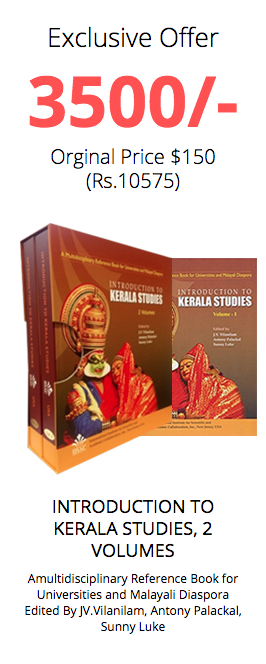
Nadirs
1,190.00₹ 890.00₹
Juxtaposing reality and fantasy, nightmares and dark laughter, Nadirs is a collection of largely autobiographical stories based on Herta Müller’s childhood in the Romanian countryside. The individual tales reveal a child’s often nightmarish impressions of life in her village. Seamlessly mixing reality with dream-like images, they brilliantly convey the inner, troubled life of a child and, at the same time, capture the violence and corruption of life under an oppressive state.

Contested Mediterranean Spaces: Ethnographic Essays in Honour of Charles Tilly
8,400.00₹ 3,900.00₹
The contributors in this volume, which is inspired and dedicated to Charles Tilly, deal with the manner in which particular Mediterranean spaces (at regional, state, and neighbourhood levels) are being reconfigured in the light of struggles over rights, resources and identities. Political processes driven from the ‘top’ (of state and municipal political hierarchies, for example) and processes of resistance from the ‘bottom’ (in the shape of environmental movements, popular artistic and decorative events and expressions, for example) are described in such a way that challenge any simple assumption about the nature and constitution of political power in the region. Our authors have approached their field sites from the viewpoint of an intellectual tradition generated by Charles Tilly and others: a tradition that we might term in shorthand the political economy of cultural geography. From this viewpoint the contested reworking and renegotiation of Mediterranean spaces and political landscapes becomes a matter not only of the activities and rhetorical/bureaucratic announcements from state or EU authorities, but also of the increasingly potent agency of a variety of other actors and institutions. These include environmental activists in Malta, cultural entrepreneurs in Crete, producers of posters and graffiti in Beirut, as well as globally affiliated cross border social and political interest groups mobilising in the streets and communities of Ciutat de Mallorca, Bethlehem, Ferrara, and Istanbul and, from there across the region and beyond.

Nature’s Aristocracy A Plea for the Oppressed
2,450.00₹ 1,790.00₹
In 1871 Jennie Collins became one of the first working-class American women to publish a volume of her own writings: Nature’s Aristocracy. Merging autobiography, social criticism, fictionalized vignettes, and feminist polemics, her book examines the perennial problem of class in America. Collins loosely structures her series of sketches around the argument that nineteenth-century U.S. society, by deviating dangerously from the ideals set forth in the Constitution and the Bill of Rights, had created a corrupt aristocracy and a gulf between the rich and the poor that the United States’ founders had endeavored to prevent.
Collins’s text serves as a mouthpiece for the little-heard voices of nineteenth-century poor and laboring women, employing sarcasm, irony, and sentimentality in condemning the empty philanthropic gestures of aristocratic capitalists and calling for justice instead of charity as a means to elevate the poor from their destitution. She also explores the necessity of suffrage for female workers who, while expected to work alongside men as their equals in labor, were hampered by lower wages and lack of control by their exclusion from the voting process.

The Idea of Popular Schooling in Upper Canada
2,290.00₹ 1,690.00₹
In The Idea of Popular Schooling in Upper Canada, Anthony Di Mascio analyzes debates about education in the burgeoning print culture of the late eighteenth and early nineteenth centuries. In it, he finds that a widespread movement for popular schooling in Upper Canada began in earnest from the time of the colony’s first Loyalist settlers. Reviving the voices of Upper Canada’s earliest school advocates, Di Mascio reveals the lively public discussion about the need for a common system of schooling for all the colony’s children. Despite different and often contentious opinions on the means and ends of schooling, there was widespread agreement about its need by the 1830s, when the debate was no longer about whether a popular system of schooling was desirable, but about what kinds of schools would be established. The making of educational legislation in Upper Canada was a process in which many inhabitants, both inside and outside of government, participated. The Idea of Popular Schooling in Upper Canada is the first full survey of schooling in Canada to focus on the pre-1840 period and how it framed policy debates that continue to the present day.

Chance: The Life of Games & the Game of Life
2,240.00₹ 990.00₹
This is a unique book on how probability affects our everyday lives. It guides the reader in an almost chronological trip through the fascinating and amazing laws of chance, omnipresent in the natural world and in our daily lives. Along the way many fascinating topics are discussed. These include challenging probability paradoxes, “paranormal” coincidences, game odds, and causes and effects. Finally the author discusses possibilities and limitations of learning the laws of a Universe immersed in chance events. This charming book, with its many easy-to-follow mathematical examples, will inform and entertain the scientist and non-scientist alike.

The Wrath of Cochise
890.00₹ 800.00₹
In a powerful evocation of the drama of the American West, here is the harrowing story of the feud that ignited the Apache Wars.

Nadirs
1,190.00₹ 890.00₹
Juxtaposing reality and fantasy, nightmares and dark laughter, Nadirs is a collection of largely autobiographical stories based on Herta Müller’s childhood in the Romanian countryside. The individual tales reveal a child’s often nightmarish impressions of life in her village. Seamlessly mixing reality with dream-like images, they brilliantly convey the inner, troubled life of a child and, at the same time, capture the violence and corruption of life under an oppressive state.

The Home Place
1,050.00₹ 890.00₹
Reproduced from the 1948 edition of The Home Place, the Bison Book edition brings back into print an important early work by one of the most highly regarded of contemporary American Writers.
This account in first-person narrative and photographs of the one-day visit of Clyde Muncy to “the home place” at Lone Tree, Nebraska, has been called “as near to a new fiction form as you could get.” Both prose and pictures are homely: worn linoleum, an old man’s shoes, well-used kitchen utensils, and weathered siding. Muncy’s journey of discovery takes the measure of the man he has become and of what he has left behind.

Atlas of temporal bone surgery
11,700.00₹ 6,990.00₹
Beautifully illustrated and comprehensive, this must-have atlas guides readers through the delicate, high-risk surgical approaches they need to successfully manage pathology of the temporal bone, the most complex anatomic area in the human body.Each consistently organized chapter addresses a different technique, beginning with a clear definition of the approach followed by a discussion of indications and key information on anatomic orientation, surgical steps, and, in many cases, surgical anatomy. Clearly labeled, full-color illustrations accompany step-by-step descriptions of common and unique operative techniques. The author, a world-renowned otorhinolaryngologist, provides detailed explanations of important anatomic landmarks and advice on how to choose the appropriate instruments at each surgical stage.
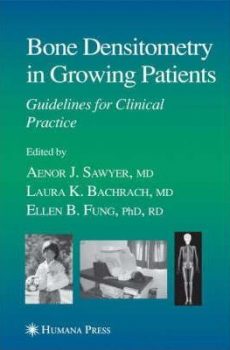
Bone Densitometry in Growing Patients
16,160.00₹ 12,399.00₹
Bone Densitometry in Growing Patients: Guidelines for Clinical Practice, edited by Drs. Sawyer, Bachrach, and Fung, is a milestone book for all health prof- sionals concerned with bone health in growing patients. The book introduces and emphasizes the importance of attending to issues of bone health and development in childhood and adolescence as a way of maintaining such health and decreasing the epidemic of osteoporosis that we are now seeing in older adults. In doing so, the book offers a much-needed first set of standards of bone densitometry in growing patients. Given the numerous reports of serious interpretation errors in densitometry results in children, the development of this body of work is truly important. It is in this context that Bone Densitometry in Growing Patients: Guidelines for Clinical Practice presents the current evidence, including an assessment of the strengths and weaknesses in the data on assessing bone density in childhood and adolescence. In short, the editors and authors have done an outstanding job of or- nizing not only the key topics in this broad clinical discussion, but also, and most importantly, the evidence within these areas.
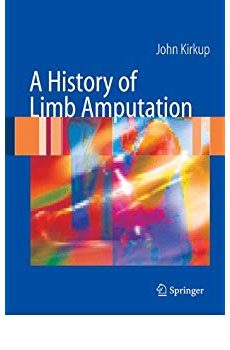
A History of Limb Amputation
16,183.00₹ 6,400.00₹
This book opens with a unique historical review of natural amputations due to congenital absence, disease, frostbite, animal trauma, and to punishment and ritual. The advent of surgical amputation and its difficulties form a major part of the book, summarising the evolution of the control of haemorrhage and infection, pain relief, techniques, instrumentation, complications, prostheses, results and case histories. Alternative procedures, increasingly important in the last two centuries, are also debated.
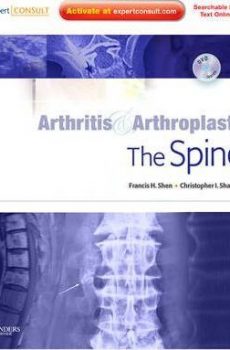
Arthritis And Arthroplasty: The Spine
18,830.00₹ 9,990.00₹
“The Spine” – a volume in the new “Arthritis and Arthroplasty” series – offers expert guidance on everything from patient selection and pre-operative planning to surgical approaches and techniques. Francis H. Shen, MD and Christopher I. Shaffrey, MD present clear, evidence-based coverage detailing which technology and methodology is best for each patient. Access discussions of debates on minimally invasive surgery; whether metal/polyethylene, metal-metal, or ceramic-ceramic is the best/most appropriate bearing surface; cemented vs. uncemented fixation of the components; and, more. View expertly narrated video demonstrations of surgical techniques. In addition to providing practical, pragmatic advice in a concise, readable format, this Expert Consult title offers the full text of the book, as well as links to PubMed and periodic content updates online.
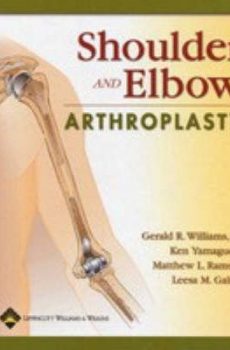
Shoulder and Elbow Arthroplasty
15,900.00₹ 3,850.00₹
Written by the world’s foremost shoulder and elbow surgeons, this volume is the most comprehensive, current reference on shoulder and elbow arthroplasty. The book provides state-of-the-art information on implant design and detailed guidelines—including treatment algorithms—on specific arthroplasty procedures for arthritis, fractures, chronic dislocations, and other disorders. More than 400 illustrations complement the text.
Each main section—shoulder arthroplasty and elbow arthroplasty—has three subsections: implant considerations, technical considerations, and disease-specific considerations. Disease-specific chapters cover surgical anatomy, pathophysiology, preoperative evaluation, indications for surgery, implant choices, surgical techniques, and postoperative rehabilitation. Also included are chapters on complications, revision arthroplasty, arthroplasty with bone loss and limb salvage, and alternatives to replacement arthroplasty. Every chapter includes a “Chapter-at-a-Glance” summary for easy review of the chapter content.
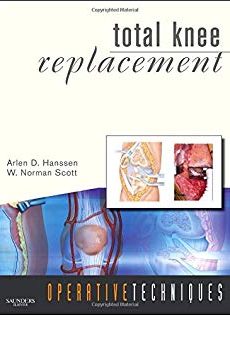
Operative Techniques: Total Knee Replacement
19,490.00₹ 9,190.00₹
This multimedia resource offers you all the how-to guidance you need to perform all of the latest and best techniques in total knee replacement. The complete, lavishly illustrated volume is made even better with a state-of-the-art companion web site! With chapters on such hot topics as cementless fixation, quadriceps sparing MIS TKR, unicompartmental TKR, soft tissue balancing, and extensor mechanism allografting, you, as well as the members of your cross-disciplinary team, will appreciate the clear and concise, but detailed and visual approach of this atlas and video collection. The result is a detailed, easy-to-use reference that no orthopaedic surgeon should be without.
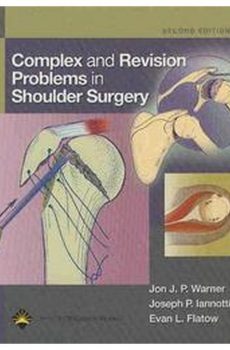
Complex and Revision Problems in Shoulder Surgery
15,290.00₹ 5,199.00₹
Written by the world’s leading shoulder surgeons, this volume offers much-needed guidance on managing complex and revision problems that cannot be solved by standard treatment formulas. The authors present successful approaches with illustrative case examples, emphasizing avoidance of common pitfalls and management of complications.
This edition has a greater focus on arthroscopic procedures and includes full-color arthroscopic images. New chapters cover arthroscopic rotator cuff reconstruction, idiopathic and diabetic stiff shoulder, alternatives to arthroplasty, and the failed arthroplasty. The thoroughly revised fractures section includes new information on two-, three-, and four-part fractures and AC/SC fractures. This edition contains over 800 illustrations.
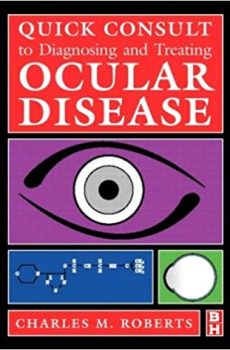
Quick Consult to Diagnosing and Treating Ocular Disease
3,780.00₹ 2,380.00₹
Instantly retrieve the information you need to diagnose and treat common ocular disorders. This reader-friendly, quick reference manual presents a problem-solving approach to diagnosing and treating common ocular disorders encountered in primary care practice. Includes helpful tables and lists for quick and easy access to information such as ocular and systemic drugs.
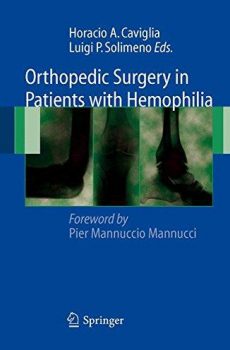
Orthopedic Surgery in Patients with Hemophilia
15,920.00₹ 7,000.00₹
Edited by two leading orthopedic surgeons who are specialists in the treatment of hemophilia, Orthopedic Surgery in Patients with Hemophilia shows all the surgical techniques needed for surgical treatment of musculoskeletal complications of hemophilia. A practical guide, designed for use on the ward or in the office, this book draws on the experience of numerous specialists worldwide, from developed and developing countries. As well as orthopedic surgery, it also covers research, hematology, and rehabilitation. Although of primary interest to the orthopedic surgeon, rheumatologist, and physiotherapist, this book will also be relevant to the hematologist responsible for the care of the hemophiliac patient.
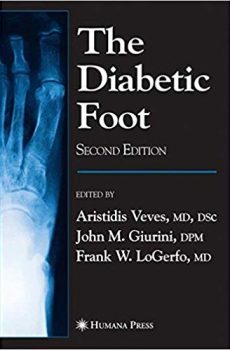
The Diabetic Foot
18,990.00₹ 4,000.00₹
Edited by renown researchers from one of the oldest and most experienced diabetic foot centers in the world, The Diabetic Foot, Second Edition, features established and effective treatments to diabetic foot disease as well as new developments in basic and clinical research. Considerably expanded and updated from the acclaimed first edition, its topics range from proven preventive strategies to cutting-edge wound care techniques that are drawn from new developments such as growth factors and living skin equivalents. Also included are new chapters on the physiology and pathophysiology of wound healing, preparation of wound bed, and new information on the development of foot imaging and treatment. In keeping with the spirit of the first edition, this volume gives the reader a full view of diabetic foot disease and emphasizes the need for a multidisciplinary approach in its management. The Diabetic Foot, Second Edition is an essential reference for the growing problem of diabetes. It will be a great value to diabetologists, endocrinologists, internists, family physicians, podiatrists, vascular surgeons, and orthopedic surgeons in finding a thorough presentation for treating diabetic foot disease.
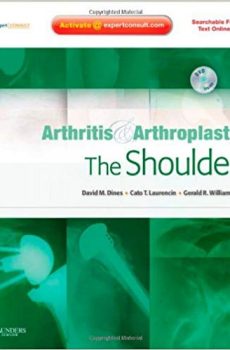
Arthritis and Arthroplasty: The Shoulder
18,830.00₹ 9,990.00₹
The Shoulder―a volume in the new Arthritis and Arthroplasty series―offers expert guidance on everything from patient selection and pre-operative planning to surgical approaches and techniques. Clear, evidence-based coverage details which technology and methodology used for total shoulder arthroplasty, reconstruction or revision is best for each patient. Access discussions of debates on total shoulder arthroplasty versus hemiarthroplasty; resurfacing, glenoid bone loss, infection, revision shoulder arthroplasty and more. Explore alternatives to total shoulder arthroplasty in younger arthritic patients and view expertly narrated video demonstrations of surgical techniques. In addition to providing practical, pragmatic advice in a concise, readable format, this Expert Consult title offers the full text of the book, as well as links to PubMed and periodic content updates, online at expertconsult.com.
- Access the full text of the book―as well as links to PubMed and periodic content updates on outcome data, component materials, and surgical techniques―online at expertconsult.com.
- Features procedural videos―narrated by experts―on the included DVD so you can see how to perform particular techniques.
- Covers reverse shoulder Arthroplasty (RSA), glenoid loosening, soft tissue failure and other hot topics to keep you abreast of the latest developments in the specialty.
- Provides evidence-based, clinically focused guidance on patient selection, pre-operative planning, technical considerations, disease specific options, the management and avoidance of complications, salvage and revision strategies, rehabilitation and more.
- Discusses variations in technique, including soft tissue releases and glenoid exposure, bone grafts, resurfacing or more radical removal of bone, and minimally invasive technique where the exposure is more limited so you can choose which is most effective for each patient.
- Explores alternatives to total shoulder arthropalsty in younger arthritic patients, including partial surface replacements, humeral head resurfacing, hemiarthroplasty, interpositional arthroplasty.
- Includes a review page in every chapter for quick reference to pearls and pitfalls for each topic.
- Presents photographs and interpretive drawings of surgical techniques in full color to bring out intraoperative details as they appear in the operating room.
Your purchase entitles you to access the web site until the next edition is published, or until the current edition is no longer offered for sale by Elsevier, whichever occurs first. If the next edition is published less than one year after your purchase, you will be entitled to online access for one year from your date of purchase. Elsevier reserves the right to offer a suitable replacement product (such as a downloadable or CD-ROM-based electronic version) should online access to the web site be discontinued.

